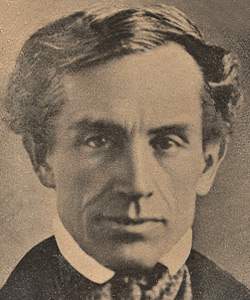Samuel Morse (American National Biography)
Scholarship
[Samuel Morse] returned in 1832 with high hopes for The Gallery of the Louvre, which he displayed in New York. But it, like The House of Representatives, failed to attract public interest. A final disappointment came when he learned that he had not been chosen to paint one of the four panels in the ceiling of the rotunda in the Capitol in Washington, a commission he had long coveted. This rebuff was undoubtedly at least in part a reaction to his strongly expressed political views, which were anti-Catholic and antiabolitionist. (He ran unsuccessfully for mayor of New York in 1836 on the Native-American ticket.)
Frustrated, Morse turned to the field of invention. He had done some experimenting with the paints for some of his portraits. And he and a brother had devised a flexible-piston pump (1817) and a marble-cutting machine (1822); the former was patented but proved impractical, and the essentials of the latter had been anticipated by someone else. On the return trip from Europe a new field presented itself to his imagination. Conversations about electricity with Charles Thomas Jackson(who would later make claims that Morse had stolen the idea of the telegraph from him) led to a consideration by Morse that "if the presence of electricity can be made visible in any part of the circuit, I see no reason why intelligence may not be transmitted instantaneously by electricity."
Frustrated, Morse turned to the field of invention. He had done some experimenting with the paints for some of his portraits. And he and a brother had devised a flexible-piston pump (1817) and a marble-cutting machine (1822); the former was patented but proved impractical, and the essentials of the latter had been anticipated by someone else. On the return trip from Europe a new field presented itself to his imagination. Conversations about electricity with Charles Thomas Jackson(who would later make claims that Morse had stolen the idea of the telegraph from him) led to a consideration by Morse that "if the presence of electricity can be made visible in any part of the circuit, I see no reason why intelligence may not be transmitted instantaneously by electricity."
Bernard S. Finn, "Morse, Samuel Finley Breese," American National Biography Online, February 2000, http://www.anb.org/articles/13/13-01183.html.








